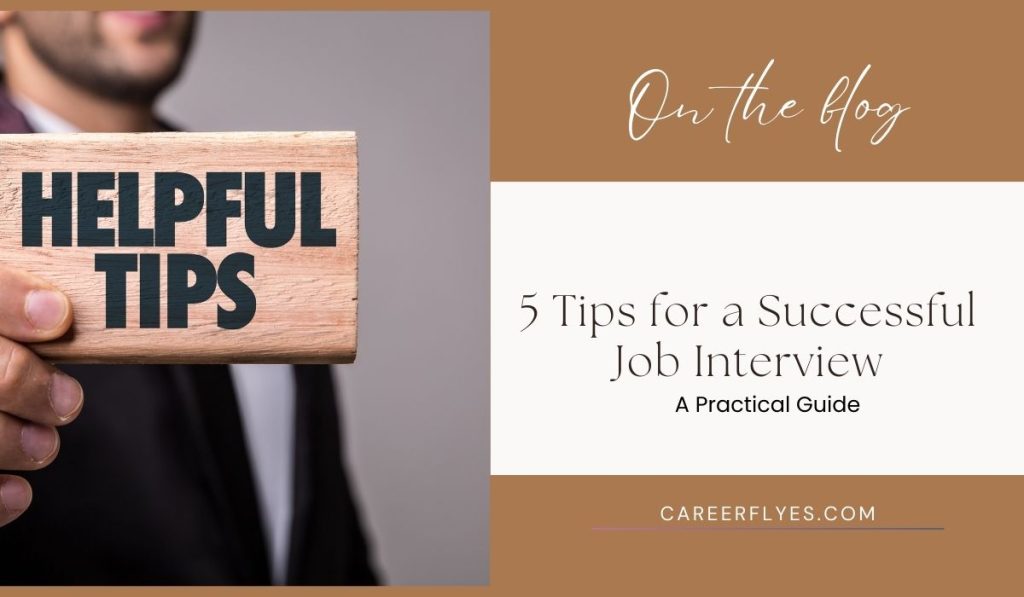5 Tips for a Successful Job Interview: A Practical Guide
5 min read
Job interviews are like the final hurdle standing between you and the position you want. They can be nerve-wracking, sure, but with the right preparation and mindset, you can walk in with confidence and leave a lasting impression. While every interview is unique, there are certain strategies that consistently lead to success. Here are five essential tips to help you ace your next interview.
1. Research the Company and Role Thoroughly
Before you step into the interview room, make sure you know who you’re dealing with. Researching the company shows the interviewer that you are genuinely interested and prepared, not just someone looking for any job.
How to Research the Company:
- Start with their website. Read their “About Us” page to understand their mission, vision, and values. Check out their products or services, and see if there are any recent updates in their news or press sections.
- Dive into LinkedIn. Look at profiles of employees who work in the same department or position you are applying for. This gives insight into the company’s culture and what kind of people they hire.
- Search for news articles or blogs about the company. Knowing recent developments or industry trends helps you connect your responses to their current needs.
For example, mentioning how you admire a specific company achievement or initiative shows that you’ve done more than a quick glance—it shows genuine interest.
How to Research the Role:
- Analyze the job description carefully. Look for the required skills, responsibilities, and how they match your background.
- Consider the company’s goals. Think about how you can contribute based on the job’s demands.
Showing that you’ve put effort into understanding the company and the job will separate you from those who just show up without preparation.
2. Practice Common Interview Questions
Practicing for common interview questions helps calm your nerves and allows you to communicate more clearly. You can never predict every question, but there are always a few classics that come up.
Common Questions to Prepare For:
- “Tell me about yourself.” It’s an open invitation for you to introduce your professional journey. Focus on experiences and achievements that relate to the role.
- “Why do you want to work here?” Mention what excites you about the company, whether it’s their growth, values, or the role itself.
- “What are your strengths and weaknesses?” Be honest but strategic. Share strengths that are relevant to the role, and for weaknesses, talk about how you are working to improve them.
- “Where do you see yourself in five years?” This is about your ambitions. Frame it in a way that aligns with the company’s future.
To help structure your answers, use the STAR method (Situation, Task, Action, Result) for behavioral questions. For example, if asked about handling conflict, outline the situation, what your task was, the actions you took, and the positive outcome.
Practice Out Loud: Recite your answers out loud to get comfortable with them. You do not want to sound rehearsed, but speaking your thoughts before the actual interview helps you become more articulate.
3. Dress Appropriately and Arrive Early
First impressions are everything. How you dress and when you arrive can impact the entire tone of the interview.
Dressing for Success:
- For corporate roles, wear formal business attire. A tailored suit, polished shoes, and a neat appearance send the message that you’re serious about the role.
- In creative industries, business casual may be acceptable. However, it should still look professional—clean, smart, and presentable.
When in doubt, aim to dress slightly more formally than what you expect the company’s dress code to be. It’s always better to be slightly overdressed than underdressed.
Arrive Early:
- Plan to arrive 10-15 minutes early. This shows punctuality and respect for the interviewer’s time.
- If the location is unfamiliar, scout it out beforehand. Know how long it will take to get there, and account for any traffic or transit delays.
Being early also gives you a chance to calm any last-minute nerves, and you’ll feel less rushed and more composed when it’s time to begin.
4. Showcase Your Soft Skills and Emotional Intelligence
While your qualifications may get you to the interview, your soft skills can determine whether you land the job. Employers value candidates who bring strong communication, adaptability, and teamwork to the table.
Demonstrating Key Soft Skills:
- Communication: Speak clearly and confidently, but also listen carefully to the interviewer. Engage in a two-way conversation, showing that you are not just waiting for your turn to speak.
- Adaptability: Share examples where you had to adjust to unexpected challenges. Employers want to know that you can handle change without losing your cool.
- Teamwork: Mention situations where collaboration led to success. Show how you can work well with others, especially in diverse team environments.
Emotional Intelligence:
- Make eye contact and use positive body language. It shows that you are confident and engaged.
- Pay attention to the interviewer’s cues. If they seem interested or ask follow-up questions, that’s a good sign. Adjust your responses based on their reactions to keep the conversation flowing smoothly.
For instance, a candidate who can smile and maintain eye contact while discussing a challenging project demonstrates emotional strength and the ability to remain composed under pressure.
5. Follow Up with a Thoughtful Thank-You Note
A thank-you note is more than just a polite gesture. It gives you one more opportunity to reaffirm your interest in the position and to show professionalism.
What to Include in a Thank-You Note:
- Thank the interviewer for their time and the opportunity to discuss the role.
- Reiterate a key point from the interview that shows your enthusiasm for the role and why you are the right fit.
- Keep it short but personal. Reference something specific from your conversation to show you were engaged.
For example, you might say, “I appreciate the chance to discuss how my project management experience aligns with your team’s goals. I am excited about the opportunity to contribute to your continued success.”
Send the note within 24 hours of the interview. This helps keep you top of mind during their decision-making process.
Bonus Tip: Be Yourself
Finally, one of the most important tips is to be yourself. Interviews are a chance for both you and the employer to determine if the fit is right. If you are trying too hard to present a version of yourself that doesn’t feel natural, it will show.
How to Be Authentic:
- Be honest about your experiences and skills. If you do not know the answer to a question, it’s better to admit it than to pretend.
- Let your personality shine through. Whether you’re enthusiastic, calm, or reflective, your individuality is a strength.
Remember, interviews are not just about you impressing the employer—they’re also about figuring out if this is the kind of place where you can thrive.
Conclusion
Job interviews may seem intimidating, but they are an opportunity to show potential employers the best version of you. With preparation, clear communication, and a positive attitude, you can make a great impression and increase your chances of success. Research the company, practice your responses, dress appropriately, highlight your soft skills, and do not forget the follow-up. With these five tips in hand, you are ready to walk into your next interview confidently.
Now go and nail that interview!





